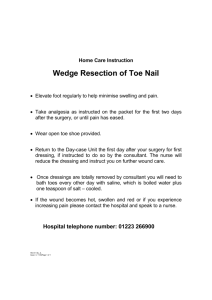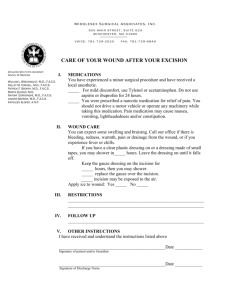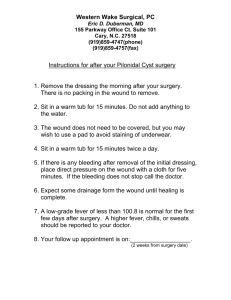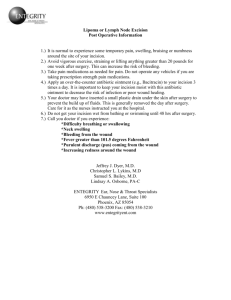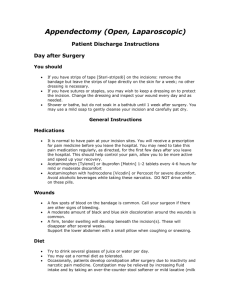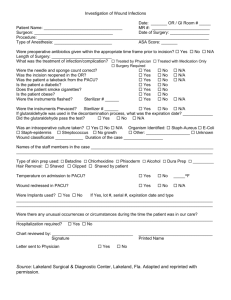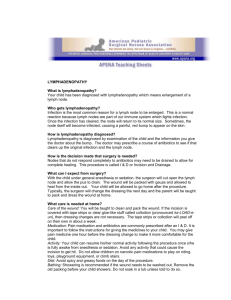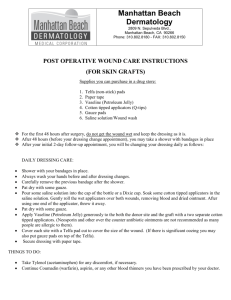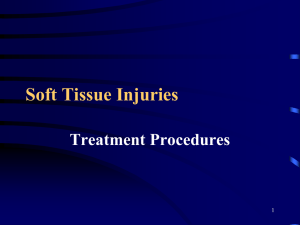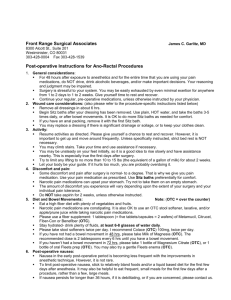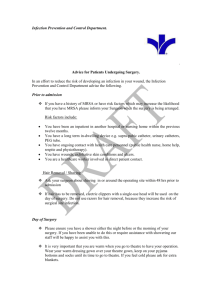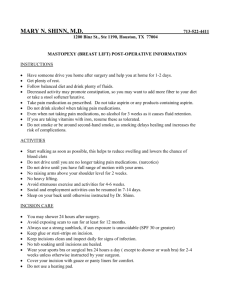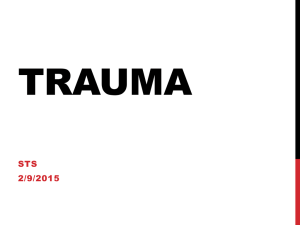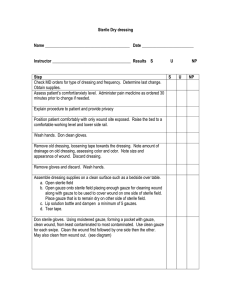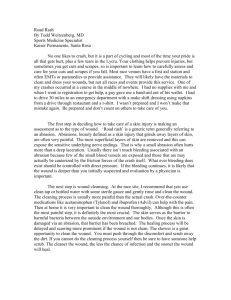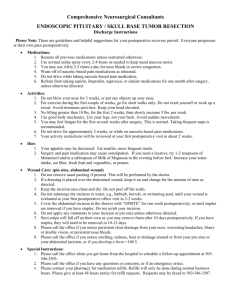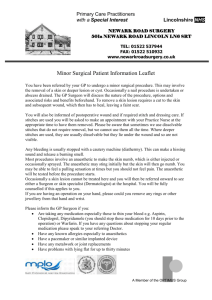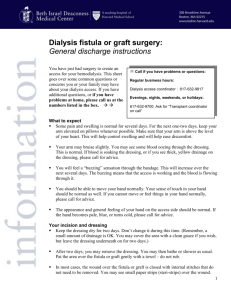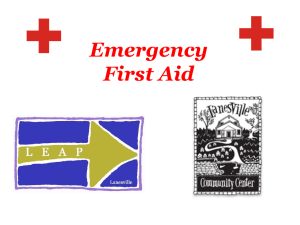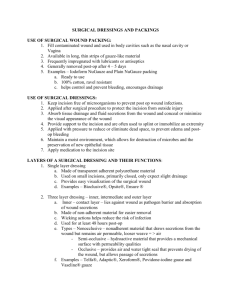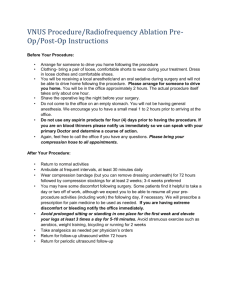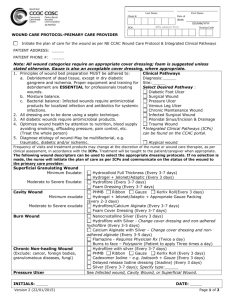Post-operative Instructions
advertisement
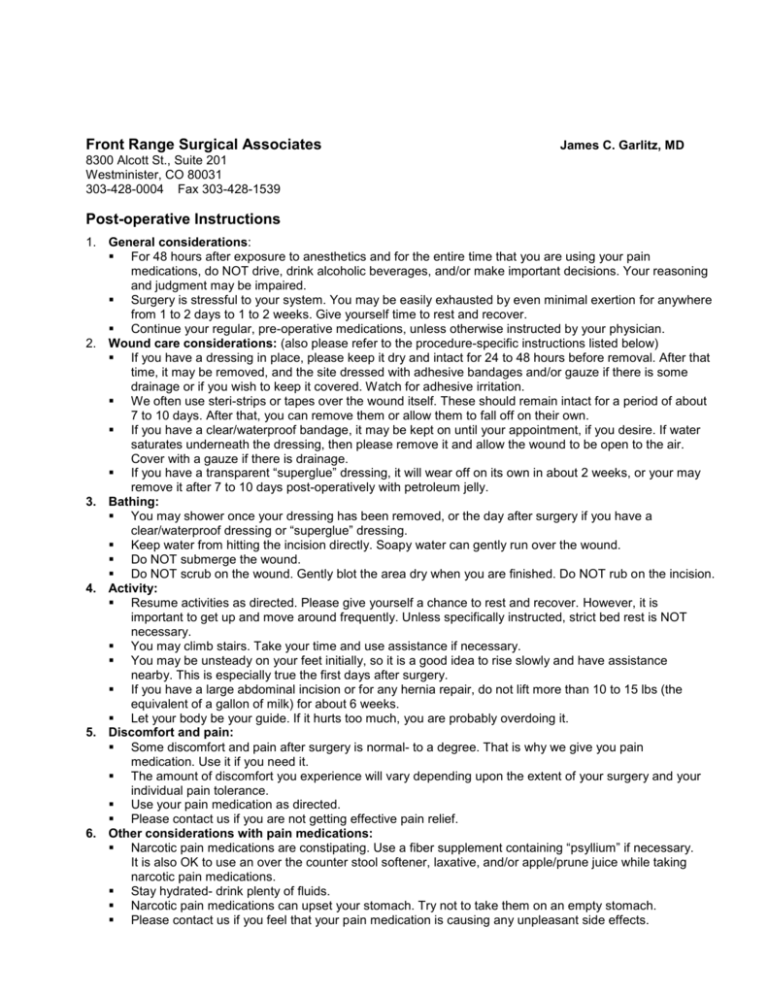
Front Range Surgical Associates James C. Garlitz, MD 8300 Alcott St., Suite 201 Westminister, CO 80031 303-428-0004 Fax 303-428-1539 Post-operative Instructions 1. General considerations: For 48 hours after exposure to anesthetics and for the entire time that you are using your pain medications, do NOT drive, drink alcoholic beverages, and/or make important decisions. Your reasoning and judgment may be impaired. Surgery is stressful to your system. You may be easily exhausted by even minimal exertion for anywhere from 1 to 2 days to 1 to 2 weeks. Give yourself time to rest and recover. Continue your regular, pre-operative medications, unless otherwise instructed by your physician. 2. Wound care considerations: (also please refer to the procedure-specific instructions listed below) If you have a dressing in place, please keep it dry and intact for 24 to 48 hours before removal. After that time, it may be removed, and the site dressed with adhesive bandages and/or gauze if there is some drainage or if you wish to keep it covered. Watch for adhesive irritation. We often use steri-strips or tapes over the wound itself. These should remain intact for a period of about 7 to 10 days. After that, you can remove them or allow them to fall off on their own. If you have a clear/waterproof bandage, it may be kept on until your appointment, if you desire. If water saturates underneath the dressing, then please remove it and allow the wound to be open to the air. Cover with a gauze if there is drainage. If you have a transparent “superglue” dressing, it will wear off on its own in about 2 weeks, or your may remove it after 7 to 10 days post-operatively with petroleum jelly. 3. Bathing: You may shower once your dressing has been removed, or the day after surgery if you have a clear/waterproof dressing or “superglue” dressing. Keep water from hitting the incision directly. Soapy water can gently run over the wound. Do NOT submerge the wound. Do NOT scrub on the wound. Gently blot the area dry when you are finished. Do NOT rub on the incision. 4. Activity: Resume activities as directed. Please give yourself a chance to rest and recover. However, it is important to get up and move around frequently. Unless specifically instructed, strict bed rest is NOT necessary. You may climb stairs. Take your time and use assistance if necessary. You may be unsteady on your feet initially, so it is a good idea to rise slowly and have assistance nearby. This is especially true the first days after surgery. If you have a large abdominal incision or for any hernia repair, do not lift more than 10 to 15 lbs (the equivalent of a gallon of milk) for about 6 weeks. Let your body be your guide. If it hurts too much, you are probably overdoing it. 5. Discomfort and pain: Some discomfort and pain after surgery is normal- to a degree. That is why we give you pain medication. Use it if you need it. The amount of discomfort you experience will vary depending upon the extent of your surgery and your individual pain tolerance. Use your pain medication as directed. Please contact us if you are not getting effective pain relief. 6. Other considerations with pain medications: Narcotic pain medications are constipating. Use a fiber supplement containing “psyllium” if necessary. It is also OK to use an over the counter stool softener, laxative, and/or apple/prune juice while taking narcotic pain medications. Stay hydrated- drink plenty of fluids. Narcotic pain medications can upset your stomach. Try not to take them on an empty stomach. Please contact us if you feel that your pain medication is causing any unpleasant side effects. 7. Post-operative nausea: Nausea in the early post-operative period is becoming less frequent with the improvements in anesthetic technique. However, it is not rare. To limit post-operative nausea, stick to relatively bland foods and/or a liquid based diet for the first few days after anesthesia. It may also be helpful to eat frequent, small meals for the first few days after a procedure, rather than a few, large meals. If nausea persists for longer than 36 hours, if it is debilitating, or if you are concerned, please contact us. 8. Contact us if you experience any of the following: Sustained temperature of 100.5 F or greater. Redness, swelling, warmth, drainage, or blistering around your incision. Sustained increase or intense pain/hypersensitivity around your incision- aggressive infections can arise as early as 12 hours after surgery. Any symptom that causes you concerns. 9. Procedure specific instructions: If you had a breast procedure, use a supportive “sports” bra for the first 4 to 5 days after surgery. It may be helpful even to wear it at night. If you had a hernia repair, let your body be your guide. If it hurts too much, you are probably overdoing it. You do not need to severely limit your activities, except as guided by any discomfort you may experience. If you have had drainage of an infection or abscess, please change the dressing starting tomorrow by removing all of the old packing, and then using a damp saline-soaked gauze dressing in the wound and then covering it with a dry gauze, and continue that twice daily until seen in the office. If you had a procedure for hemorrhoids or if your wound is by the rectum, you may soak in warm water for comfort, and then redress the wound as instructed. 10. Please Note: Pain medication refills can only be done during regular business hours, Monday through Friday. 11. Follow- Up Appointment Please schedule a post-operative appointment with my office for about 3 weeks after your surgery, unless otherwise instructed. Please notify my office if there are any scheduling changes that need to be made. These instructions are not a substitute for your own good judgment. Please contact me at any time if you have any questions or concerns. I can ALWAYS be reached at 303-428-0004. If it is after regular office hours, our answering service will contact me or the physician on call. There is coverage 24 hours a day, 7 days a week to ensure that your questions are answered expertly and expediently. If you are concerned that you may have a severe, life or limb-threatening problem, please call 9-1-1 first, or go directly to the nearest ER. I look forward to seeing you at your follow-up appointment. Thank you for the opportunity to participate in your health care. Sincerely, James C. Garlitz, MD Rev. 7/15
